 |
 |
 |
 |
 |
 |
 |
 |
 |
First Division - Elland Road - 48,350
Scorers: Charlton
Leeds United: Sprake, Madeley, Cooper, Bremner, Charlton, Hunter, Bates, Clarke, Jones, Giles, Gray
Arsenal: Wilson, Rice, McNab, Storey, McLintock, Simpson. Armstrong, Graham, Radford, Kennedy, George
By the time the two sides met in a crucial clash
at Elland Road on 26 April, it was the Gunners who had gained
the ascendancy, first hauling in and then ultimately overturning
a United advantage that at one stage stood at seven clear points.
By the time the two clubs met in their crucial end of season fixture,
Arsenal had managed to work their way a point clear, with a game
in hand, and had established a marginally superior goal average
by virtue of their defensive fortitude. Leeds' challenge had faltered on the back of two damaging
defeats, 3-1 at Chelsea at the end of March and a
controversial 2-1 reverse against West Bromwich Albion at Elland Road
on 17 April. In contrast, as the tension mounted, Arsenal were proving
the toughest of nuts to crack, stringing together a startling run of narrow
wins secured by late goals. United had closed the gap the previous weekend by
winning 3-0 at Southampton while the Gunners could only draw 2-2
at West Bromwich, but prior to then the Londoners' consistency
was quite remarkable. Since their 2-0 defeat at Derby on 27 February,
they had played nine League games and won the lot, conceding a
single goal. During this period they also won their way through
to the FA Cup final. A win for Arsenal at Elland Road would guarantee
them the title, and even a draw would leave the Gunners red hot
favourites; it was win or bust for Don
Revie's men. United's victory against Southampton owed much to a brace
of goals by Mick Jones, scored on his 26th birthday. The performance evidenced
their resilience and positivity of mood. Barry Foster reported in the
Yorkshire Post: 'Leeds United are back in top gear ... They pulled
off one of their great victories on Saturday. It was well paced, laced
with a little luck at the right time but best of all it was Leeds playing
in champion style - the type of crisp, inventive stuff they opened the
season with. One of the main reasons for this was the full return to power
of Gray. Whenever he had the ball something was happening. Leeds did not
have to hope that high passes into the penalty area would find their high-priced
spearhead - they had the men to take the ball around the defence. Gray
showed he could take on two men with ease, Cooper looked better in attack
with the winger's support and Leeds, with this attacking advantage, could
always afford an extra man in defence whenever the situation called for
it and so smother Southampton's often admirable scoring efforts. With
Madeley Both United and Arsenal were able to select from
strength for the showdown, although Leeds were without Peter Lorimer,
suffering with a hamstring injury. Sprake, Cooper, Giles, Clarke
and Gray all sustained knocks against Southampton but were adjudged
fit to play, while Reaney had recovered from an injury picked
up while on England duty. With so much riding on the outcome of the match
it was inevitable that there would be a nervy opening. The tension
was palpable and in the circumstances one could understand the
reluctance of both teams to commit themselves wholly to attack.
They struggled to find their football and there were misplaced
passes aplenty as a packed crowd looked on. Barry Foster: 'With supporters climbing on stands for vantage
points and some on the roof of a public house and poster hoardings outside
the ground there was plenty of atmosphere.' The FA Cup final referee, Great Yarmouth's Norman
Burtenshaw, took over at the last minute when it was announced
that the original appointee, Jim Finney, was unavailable after
being involved in a car crash. Burtenshaw demonstrated from the
first that he would allow the players little latitude. His approach
ensured that while the match was hard fought and competitive it
never spilled over into confrontation. However, by the break he
had awarded 25 free kicks for fouls, with 14 of them going to
United. It was 20 minutes before the first shot. That came
when Arsenal schemer George Graham tried his luck from 25 yards
and was wide with his effort. Mick Jones was similarly wayward
for Leeds a minute later with a header. The best attempt of the half came from John Radford.
He caught a clever long through pass from Charlie George, beat
Norman Hunter and Terry Cooper skilfully by flicking the ball
over his own head, turned smartly and fired in a low cross shot
which Gary Sprake did well to save, coming off his line to save
at full stretch. It was a rare opportunity in a game that seemed
fated to end in stalemate; there was such tension in the air that
you could slice it with a knife. Players were too intent on avoiding
the mistake that could ruin their side's chances to take the risks
required to reap the desired reward. It was clear even quite early in proceedings that Arsenal
would be content to return south with a point and their front men were
for most of the evening cast in the role of innocent bystanders. According
to Eric Todd in The Guardian, 'It must be a long time since their
forwards were so ornamental and less effective. This was not to detract
from the merit of the Leeds defence, of course, but Arsenal's qualities
were essentially defensive, and here McLintock looked what 'Leeds ... had nearly all the play ... There was not enough
destructive power or contribution up front for all the admirable prompting
of Giles and Bremner ... Midfield monopoly is all very well within its
limits but translation into goals is the only end product that counts.' No one was really surprised when the game reached
the break without a goal being scored. For Arsenal, the Holy Grail
of a draw was within reach and they must have felt that they could
hold out for a vital point. Nevertheless, they were forced back
onto deep defence for most of the second half as United wound
themselves up for the final charge that might yet rescue their
season. Geoffrey Green in The Times: 'Radford again forced
Sprake to a couple of point blank saves following a free kick by Rice.
By then, however, Leeds, with a growing frenzy, had raised the power of
their game a notch or two. Those last 20 minutes reached great heights,
with McLintock, from first to last a magnificent centre-half, now firmly
supported by his left hand man, Simpson, as he and the rest held down
wave after wave of white shirts bearing down on them from left to right. 'In a flood of corners, 21 men were to be seen in the Arsenal
penalty area as Leeds tried so desperately to squeeze the goal that would
keep their hopes alive. But all the time time was stalking them as Arsenal
held on, not by their fingertips, but by a defence guarding Wilson like
some tall range of mountains. 'Once, with ten minutes left, Hunter glided a header from
Giles' corner past Wilson, but there was McNab to clear off the line inside
the post; a 30-yard flash by Cooper was headed out for a corner by Radford,
Arsenal's centre-forward. That in itself showed how the north Londoners
were guarding their stockade. Next, a diving header by Gray was kicked
out by Simpson, and when the ninetieth minute had come there still remained
more, the injury-time of a hard, driving match; the extra grains of sand
from which a decision was finally squeezed - a decision that will be argued
for a long time to come.' Don Revie and his men always prided themselves on
fighting to the bitter end and never accepting defeat, but even
they must have feared that the task was beyond them. As the end neared, Arsenal obstinately refused to
retreat the required ten yards as Leeds prepared to take a free
kick just outside the Gunners' box. Their protests soaked up minutes
and meant there would be a significant element of injury time;
United made the breakthrough at the start of that period. Geoffrey Green: 'As Leeds piled on their last furious barrage
for a breakthrough to 'Striking with a quick central attack, the ball sped from
Clarke to Giles then Bremner and on to the tall, long-legged Charlton,
adding his weight to the final attack. At that moment the Leeds centre-half
looked a clear two or three yards offside as Wilson came at him. His shot
hit the foot of the post, came back at him and rebounded into the Arsenal
net for victory. 'The official version - the Leeds official version, that
is - was that the ball had touched McNab before it crossed the line, which
made it a good goal. Yet Charlton himself surely was offside before McNab
made his last ditch effort to recover the situation. There it was, another
neurotic, excitable and tense finish to a relentless battle. At that moment,
with the referee pointing to the centre of the field, the Arsenal players
jostled and bustled both the referee and the relevant linesman. 'One could only feel sadness for Arsenal. For this to have
happened to them in injury time was hard enough to bear. For it to happen
with a goal which none of them will ever believe was legitimate will doubtless
make it unbearable and enter their dreams for a long time to come.' The Arsenal players harried referee Burtenshaw all
the way back to the centre circle, protesting vigorously as they
went. George hoofed the ball into the stand in his frustration
and was booked for his trouble. It was to no avail. Just as Ray
Tinkler had steadfastly refused to disallow a goal for West Bromwich
on the same ground nine days previously, Burtenshaw was equally
resolute on this occasion and no one in a white shirt was arguing
this time. The game finally resumed when the furore died down
and United eked out those remaining minutes in comparative safety
to secure the victory they so badly desired. Arsenal manager Bertie Mee was relatively restrained in
his post-match comments, saying, 'I have a responsibility to my players
on these occasions. A very harsh decision was given against them by the
referee and I am convinced, as my players are, that Charlton was in an
offside position. But we must accept that His captain, Frank McLintock, was more forthright: 'It's
terribly disappointing to play as well as that and lose to a goal like
that. Jack was five yards offside - even the Leeds players knew it.' It was a fantastic result for Leeds on a night of
high emotions, leaving them still in with a chance of the championship
they coveted so much, now a point clear. In the final reckoning
it would not be enough to see them regain their title, but certainly
they had shown that when the odds were against them they were
still able to pull one final cat out of the bag. 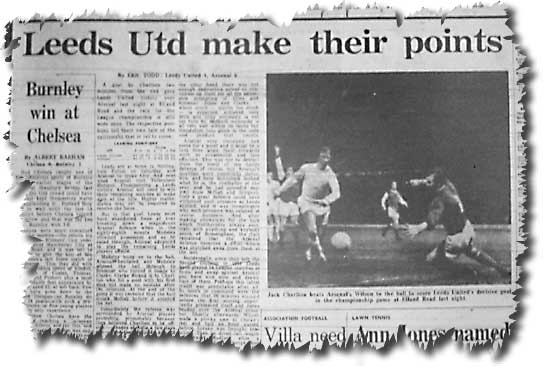 Throughout
the 1970/71 campaign, Leeds United and Arsenal were nip and tuck at each
other in the race for the League championship. Since 21 November the two
sides had enjoyed a monopoly of the top placings. For the vast majority
of the period, United held the upper hand, but had seen their dominance
whittled away in the New Year.
Throughout
the 1970/71 campaign, Leeds United and Arsenal were nip and tuck at each
other in the race for the League championship. Since 21 November the two
sides had enjoyed a monopoly of the top placings. For the vast majority
of the period, United held the upper hand, but had seen their dominance
whittled away in the New Year.
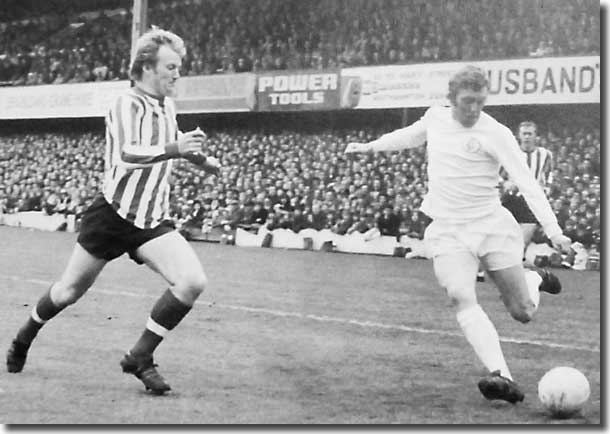 joining
Hunter and Charlton at the back,
the Leeds defence looked as solid as it has done for a long time.'
joining
Hunter and Charlton at the back,
the Leeds defence looked as solid as it has done for a long time.'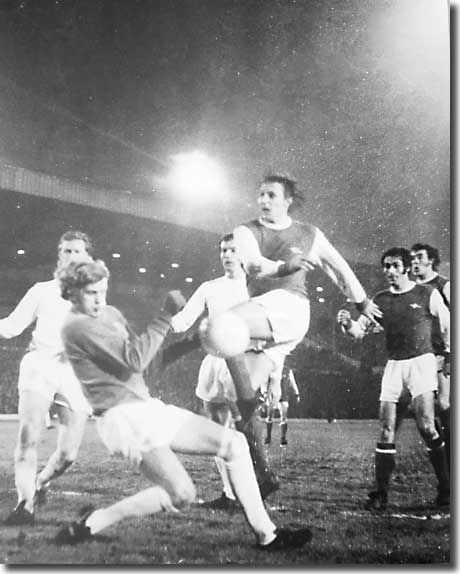 he
is, the Footballer of the Year, and he had splendid support from McNab
and Simpson. Only a great defence could have withstood such pressure as
Leeds applied, and it was inexplicable why such pressure was relaxed at
crucial moments.
he
is, the Footballer of the Year, and he had splendid support from McNab
and Simpson. Only a great defence could have withstood such pressure as
Leeds applied, and it was inexplicable why such pressure was relaxed at
crucial moments.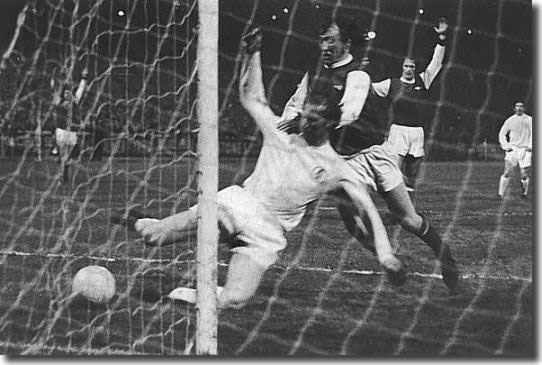 keep
themselves in the race for the championship title, and as Arsenal, with
time strongly on their side, continued to defend magnificently as the
last seconds of a taut battle unwound, the Yorkshiremen threw themselves
into what seemed to be their last assault.
keep
themselves in the race for the championship title, and as Arsenal, with
time strongly on their side, continued to defend magnificently as the
last seconds of a taut battle unwound, the Yorkshiremen threw themselves
into what seemed to be their last assault.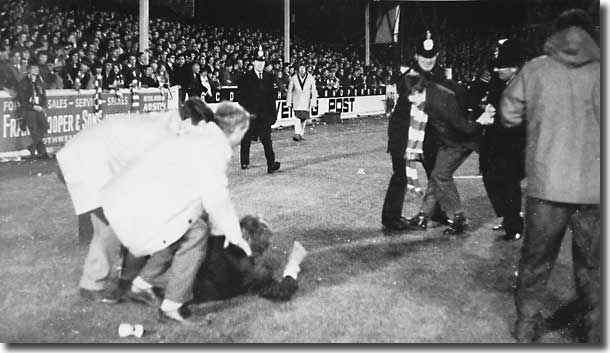 referees are human and last night's decision was the result of a human
error ... A decision was made and we have to accept it ... Mr Burtenshaw
had a good game. It was a very difficult match to take charge of, and
I believe he did well.'
referees are human and last night's decision was the result of a human
error ... A decision was made and we have to accept it ... Mr Burtenshaw
had a good game. It was a very difficult match to take charge of, and
I believe he did well.'